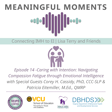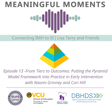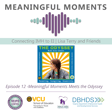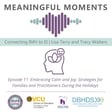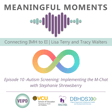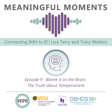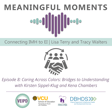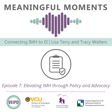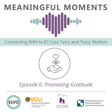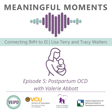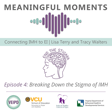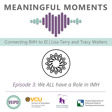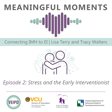Become a Creator today!Start creating today - Share your story with the world!
Start for free
00:00:00
00:00:01

Stress on Caregivers and Children
In this episode, Lisa and Tracy discuss the impact of stress on caregivers and children, the various stress factors families are facing, and ways to help families manage stress. Visit https://veipd.org/main/index.html or https://www.vaimh.org/ for more information.
Transcript
Introduction to 'Meaningful Moments' and Hosts
00:00:11
Speaker
Welcome everyone to our very first episode of Meaningful Moments. We are so excited to have you here today. My name is Lisa Terry. I am an early intervention professional development consultant with Virginia Commonwealth University at the Partnership for People with Disabilities. And I am also endorsed as an infant family specialist. I'm gonna allow my co-host to go ahead and introduce herself before we get to a quick sponsor
00:00:41
Speaker
or message. Yeah. Hey, Lisa. Thanks. It's so good to be here with everybody today. I am so excited to be with you guys. I am the state coordinator for Infant and Early Childhood Mental Health at DBHDS. And Lisa is one of my partners in crime.
Podcast Purpose and Collaboration
00:00:58
Speaker
We're so happy to be here with you guys today to talk about all things infant mental health and early intervention. So glad we're all showing up in this space together.
00:01:10
Speaker
Thanks, Tracy. So this podcast is actually a collaborative effort from the Virginia Department of Behavioral Health and Developmental Services through a contract with the Partnership for People with Disabilities at Virginia Commonwealth University.
Impact of Stress on Parents and Caregivers
00:01:26
Speaker
So we are going to go ahead and get started and dive right into our topic. So Tracy, what are we going to talk about today?
00:01:34
Speaker
Well, Lisa, sadly, we are talking about stress, and that is impacting everybody right now. But, you know, it's a really important topic to kind of unpack, right? And so today we're going to really be talking about what the stress has looked like on parents and caregivers and children, right?
00:01:53
Speaker
As early interventionists and as professionals in the field, Lisa, you and I know what this looks like on a day-to-day basis for everybody. You and I talk to early interventionists every day and infant mental health practitioners, and so we are hearing so many voices from the field right now about
00:02:12
Speaker
what children and families are facing. And it is really daunting, right? So just unpacking that a little bit more is like looking at where we've been, right? I mean, look at the last three years. And you're a parent. I'm a parent. I'm a grandparent. So we know what this involves when we're looking at family dynamics, like just the day to day, even if things are going perfectly or as perfect as they can be.
00:02:42
Speaker
But what happens when there's some extra adversity, right? Like how are we facing that as professionals and then we're looking at parents. So we really want to talk today about like what they're facing out there and like what the pandemic has actually pushed in for our parents. So
00:03:01
Speaker
Yeah, I think that's where we could begin just like kind of talking about what is happening.
Stress Effect on Child Development
00:03:08
Speaker
I know that one of the things we want to really talk about too is like there's a lot going on in the brain of young children, right? And those first years of development. I mean, when we're looking at you do the growing brains series, Lisa,
00:03:22
Speaker
you know, all about good brain development, right? And what that means to us both as parents and as professionals. So there's a lot going on in that first year of life and there's often a great deal happening for the family as well. So we really want to talk about that and what that's going to look like and how we're going to be intersecting with that. So yeah, any insight into that you have.
00:03:50
Speaker
Yeah, Tracy, I mean, I agree and stress. I think, you know, we all have to be on the same page about it, right? Because it impacts every single individual and it really can have this ripple effect where it just spreads across the household, right? And through those family dynamics, through the interactions and it can impact the family's routines and
00:04:16
Speaker
If we really stop and we think about it, let's think about how do we respond when we are stressed, right? So Tracy, how does stress impact your mind and your body? How do you respond to stress?
00:04:32
Speaker
Lisa, I mean, this is such a good question for us all to be reflecting on, right? As parents and caregivers, we need to realize that, like, what we are feeling internally, even though, like, in our best moments, we're like, I'm going to get myself regulated, right? Because regulation is such an important piece of, like, parenting and self-care as adults. But when we say, oh, I'm going to get myself regulated,
00:04:57
Speaker
We still show signs of stress, right? So how does that show up? I mean, that shows up in a myriad of ways, right? We might be really, like,
00:05:08
Speaker
sleepless at night. So when you're sleepless and your mind is like turning on all those pieces, right, we're not getting our best rest. And so we might be a little short the next day, we might be a little snippy, right? We might have like a shorter attention span, or we might be forgetful, right, of those common things that we're usually like really, really super good at remembering, especially moms and dads, remember all those details of what needs to happen for their children, right?
00:05:34
Speaker
But when we're sleepless, that really impacts. The other thing is, are we eating well? Like eating well, really caring for ourselves in terms of what are the good routines that we need to keep in place so that sleeping, that eating, that taking time out for ourselves really impacts how we're showing up for our children, right? And so we know that when we're feeling those things and those routines change for us,
00:06:02
Speaker
they also change for our children, right? We see that reflected. I mean, we definitely see that reflected in our children. And I think as parents, that's when sometimes we get distressed. We may not see it in our own selves, but when we see our children, their behaviors changing, their sleep patterns changing, their eating patterns changing, we really start to see that. I mean, have you experienced that before, Lisa?
00:06:29
Speaker
Right.
Understanding Stress in Young Children
00:06:30
Speaker
Yes. Tracy, it's so funny because I just had a visit today with a family and I asked the family, I was like, how are you taking care of yourselves? Because they have a little one who just has a lot of behaviors and tantrums. And I was like, how do you communicate that with each other? And the mother was like, you know, we just talk and I'm like, I need a break.
00:06:55
Speaker
And so tag your it. So communicating between each other is so essential because you're right, stress, people, the way that we respond to it, it can be physical, it can be emotional. Like for me, I know I tend to get very overwhelmed and I get anxious, but I check out. And so I just need a moment to kind of decompress myself.
00:07:19
Speaker
and have like peace and quiet so I can kind of reorganize myself. And the hard thing about that is we can do that as adults, right? Because we have the experience and we also have the capacity to regulate ourselves with young children, especially young children under three, they are just reacting based off of their emotions.
00:07:40
Speaker
And so if they're stressed, their emotions are super heightened, right? And so that's how they're responding. And they're showing it in all of these different behaviors. And it's really important for us to kind of break that down and understand what is going on.
00:07:55
Speaker
With that child, what kind of stress is impacting them too?
Types of Stress and Supportive Relationships
00:08:00
Speaker
When we think about stress, there are three different types of stress. We have positive stress, we have tolerable stress, and then we have toxic stress. The biggest difference
00:08:11
Speaker
is whether or not that child has a supportive adult to help calm them and regulate their system, right? So that co-regulation piece is so essential and so positive stress. Those are
00:08:27
Speaker
everyday things that are just natural. It really does actually help us, too. It's very normal. It could be something for a child as simple as just waiting for their bottle to warm up. For adults, this could be if you change jobs, right? And so those are just everyday positive stressors that we handle. And the key is, again, for that child to have that supportive relationship. That is what keeps it to maintain a positive stress.
00:08:56
Speaker
Tolerable stress could also be something else, and that could be a little bit more longer lasting. Did you want to add anything, Tracy? Yeah, I just wanted to say that, you know, adversity, we do need to remember that adversity is an important tool for growth and development, right? And so,
00:09:14
Speaker
you're right about this tolerable stress. We need to really be thinking about that because, you know, there are some camps that think like we just need to avoid all stress and that is not possible, right? So we want to send that message to parents out there like this is not the world we live in. Like stress is going to push into every day several times of the day, right? But it's really how we're managing that stress and how we're modeling, how we're getting through and like what our strategies are.
00:09:43
Speaker
in front of our children, right? Because that's when you're talking about that regulation, Lisa, that's when that really pushes in, right? That co-regulation of like teaching children like, yes, this is a stressful moment, you know, but we're moving through this. And there's lots of strategies
Teaching Stress Management to Children
00:09:59
Speaker
about that, right? Like you can do a narrative narration, like forecasting for a child, like, oh my goodness, you know, this is really a difficult moment, but we are going to get through this. Let's see how we can solve this problem.
00:10:12
Speaker
Really talking that out loud for a child, even in the infancy stage, builds the building blocks for that. So that as they grow, they're learning to pick up on that skill as well. So I'm really happy that you're talking about that tolerable stress. It's really important. It's a part of daily life, and we should expect that. And we should use it as a teaching tool and a teachable moment when it happens.
00:10:42
Speaker
Right. Well, especially because tolerable stress, it's a little bit more prolonged. It's a little bit, you know, longer lasting. And one of the things that you brought up at the beginning of the podcast was a pandemic and a natural disaster actually can be a tolerable stress because it's a little bit more longer lasting. It's a little bit more intense than the positive stress. Right. And so again,
00:11:04
Speaker
kids that are a little bit more resilient through the pandemic that we face, it's because they have that supportive caretaker that is there for them to help calm their system. And what happens if they don't have that is where it can turn into more toxic stress.
Social Determinants and Isolation
00:11:21
Speaker
And I know a lot of people have heard a lot about toxic stress, but that's really that strong and that prolonged activation of the body system.
00:11:30
Speaker
in the absence of a nurturing adult support system. And so high levels of stress over time, that's going to cause cortisol. And that's a stress hormone that will actually just continue to flood and flood the brain, which can actually alter the way it develops. And that's what you were talking about at the beginning when we talked about brain development and big
00:11:55
Speaker
types of toxic stress could include child abuse, neglect, severe maternal depression, that could be another one, parental substance abuse, family violence, or even living in poverty. All of those can actually be toxic. And so we have to make sure that we are nurturing those relationships and promoting the parent-child interactions between the caregiver and the child.
00:12:22
Speaker
Yeah, Lisa. And, you know, when you're talking about all the things that you're listing there, like the different ways that toxic stress could push into, and I think sometimes needs to be a moment where we pause and think about where all these stressors can come from, right? So, you know, one of the things we know is the social determinants of health, like there's a lot of stress that pushes in for, and when we're talking about the social determinants of health and
00:12:47
Speaker
That's the thing we've been really diving into for the last couple of years especially, but really thinking about job security. These are all things that we really saw highlighted during the pandemic, right? And they were there before, they existed before, but I think they were like really highlighted during the pandemic for children and families. And so I think that there's been more attention centered on this
00:13:17
Speaker
But really just thinking about that whole piece of where you live, many of us have heard like influential economicists talk about the fact that like your zip code, right, where you live really determines the quality of your life. This is a really big piece that is tied to poverty. That as far as like school systems, what kind of resources you have in your neighborhood,
00:13:44
Speaker
What is your social capital? You know, do you have relatives, kith and kin, that are nearby to support you in difficult moments? All of this makes such a big difference, and I think we are just really uncovering, like, the impact of that, even though it's always existed, right? But now we're really seeing, like, how this is pushing into the lives of children and families, and then how that is showing up for them. Like, are they more isolated, you know?
00:14:14
Speaker
Sometimes families really are feeling badly about what they have to offer in the community, or they're not feeling engaged or connected, and so they withdraw.
Parental Stress and Child Security
00:14:25
Speaker
And so that really enhances stress for families and children. We think about
00:14:33
Speaker
children in the context of the family, in the context of the community, just like wanting children to play with other children, right? And just having those social, emotional tie-ins of like good, healthy play, which is such a healthy thing for a family to see. A lot of times families, they just, they stay clear of it, right? Because there's so much going on and the stress has gotten to a point that it's like one more thing to muster, right? And so,
00:15:03
Speaker
We want to be thinking about how that is impacting these children. Just these things that happen in our daily lives, time and place, right?
00:15:13
Speaker
Right, Tracy? Well, and I think that's where we need to think about it because when parents are dealing with their own feelings of stress, they're becoming anxious. They're feeling emotionally drained. They could be overwhelmed. They could be out of sorts and not as responsive actually to their children, right? And so we're missing a lot of those responsive interactions.
00:15:38
Speaker
And this can actually make a child feel a loss of their secure base. And that's what's really helping them to manage their feelings. They can become dysregulated and feel out of control just emotionally. And so over time, what will happen? This will actually damage a child's feelings of trust and security.
00:15:59
Speaker
in their relationships and in the world around them. And parents can also be so distressed or haunted by their own traumatic experiences, right that they've faced in the past, and they can't regulate themselves, let alone help manage their child
00:16:15
Speaker
regulate themselves, right? And so in these situations, that's where children are really starting to perceive parents actually as more of a risk or a danger than protection. Isn't that crazy, right? And so just as that consistent, that nurturing and tuned in caregiving can wire the brain for optimal development, we have to also remember that chronic or unrelenting stress can actually undermine the neurological and physiological health of a child.
00:16:43
Speaker
And what's very interesting is that unintentionally what will happen is the caregivers will actually pass their own stress on to their child. So it's bi-directional where also the child, they can pass their stress on to the caregiver too.
Child Behavior and Stress in Parenting
00:17:01
Speaker
And so it's really important for us to really think about how a child is
00:17:07
Speaker
behaving and what that means to us. We've got to understand it. We have to break it down a little bit more. Some of the things that I always look for, I always ask parents first, tell me about your child's sleep, which you've mentioned. Tell me about their nutrition, which you mentioned. And I say, tell me about any other stress factors or changes or disruptions in that child's routine, right?
00:17:27
Speaker
Lisa, I mean, you're hitting on all the big, all the big things, right? And we need to be looking at, you know, what this all means for parents, right? And I think that one of the things you touched on that is a big infant and early childhood mental health concept is the ghost in the nursery, right? And so when we're talking about that, we're talking about these traumatic experiences that may have happened for parents that might be triggered
00:17:55
Speaker
as we are facing these pandemics or these stressful moments. Sometimes we become less of our best self. It's harder for us to show up in positive ways and for our children when we are triggered.
00:18:10
Speaker
And I think that's an important thing. It's a normal part of parenting, right? We all face that. But it's one thing we just need to acknowledge. We just need to acknowledge that we have had things in our lives that we bring to the relationship with our children.
00:18:25
Speaker
And the other thing that's really important is when we look at some of the journals of psychiatry, one of the things they talk about is how an infant or a child's development is, you know, just intrinsically linked to the relationship that they have with their parents. So that relationship, that attunement that happens between child and parents really shapes that emotional bond and it's fundamental for that child's mental health.
00:18:54
Speaker
It's fundamental for their overall growth and development in all the learning domains. We know that. And there's just like this general consensus out there that it's the parents' quality of sensitivity to that small child and their ability to attune that really affirms for that child that secure base that we're talking about and that self-regulation.
00:19:16
Speaker
and really support that organized attachment. Because we know that that is the foundation, right, for good health. Just overall development is that strong sense of relational health and attachment, and we need that to show up in these caregiving relationships. But when we're looking at our own stressors, and we're talking about our own ghosts in the nursery, and we're talking about some of the things that you're talking about with the stress pushing in,
00:19:44
Speaker
we're limited, right, in how we can show up for these children.
Reflecting on Parental Stress Management
00:19:48
Speaker
And I think that's just a realization that we're making right now when we're looking at how the last three years has really impacted that for us as parents. Right, Tracy. And I think it's really important too when you think about the ghosts in the nursery, like one thing I always talk to parents about too, how did your,
00:20:10
Speaker
your parents handle stress growing up because that's what I really try to emphasize that how you're responding to stress is how your child will learn how to deal with their own stress and manage that, right? And so thinking back, how did your family
00:20:29
Speaker
you know, react, how do they respond to stress? And how do you want your child to do that? And so I have them like envision like, if you, as your child gets older, right? How do you want them to manage stress? What would you like to see them doing? And how are you modeling that then, right? So I have them reflect on it. And then how are they modeling managing stress in front of their child?
00:20:55
Speaker
Yeah, Lisa, I mean, I think that's such a good point, right? Because what we need to do is just think about where we are in time and space as parents, right? What are, and a lot of times I tell parents like, hey, you know, if you have time just to jot down, what's a difficult moment for you during the day, right? When we look at those routines, and there's so many different like tools that you can look at routines, like I'm thinking about the miser is a great tool for that.
00:21:21
Speaker
and you look at all the different routines that you like flow through the day with your child and would you really unpack that? You have a busy day with your child, right? It's packed full of things, right? So really looking at what goes well for you as a parent and what is stressful for you is always a really, really good place to start, right? Because that helps us to identify our stressors and also then acknowledge and then
00:21:48
Speaker
Create an action plan, right? And great early interventionists and great infant mental health folks, they always go in with these plans of helping parents really identify that and then unpack a plan to support them.
Stress Management Strategies for Parents
00:22:02
Speaker
And so really helping that parent realize, like, yes, you know, breakfast is really stressful for us, right? We're still trying to get dressed. We're still trying to get food in. We're still trying to brush our teeth and get out the door, right?
00:22:15
Speaker
And then when we think about those ghosts in the nursery, and we're really thinking about the fact that, you know, when my parents were stressed, everybody got really shut down. Am I showing up in that way for my child? And then what's the impact on my child? If I am doing that? And how can I look at that differently? Right? Like, what can my action plan be? I think those simple steps can make a real difference in our stressors. And also those just those check ins with ourselves.
00:22:44
Speaker
so important. Like, how are we managing our stress? Right? What are the strategies? Like, what's your call to action for that? Like, are we taking like, you know, so many deep breaths, like seven deep breaths in, four out, you know, what kind of strategies can we use to like calm ourselves so that we calm our children?
00:23:10
Speaker
Right. And I think another huge important piece of this is educating parents about the child's brain development, right? Because we know in early childhood that the part of the brain that's going to control our reactions to stress, that's the bottom function of the brain that's fully developed at birth, right?
00:23:28
Speaker
However, the forebrain, especially in young children, and that's the piece that really allows us to think about our feelings and remember and reflect on those past experiences, that's still maturing. And so we really need to help parents understand that children are,
00:23:46
Speaker
acting this way, because they want to upset you, right, or they want to stress you out. This is very a typical part of brain development, because their brain is still maturing. And this is why, you know, if you're at the grocery store, and you see a toddler having a tantrum at the checkout aisle, because they want a piece of candy, that's very typical, right? If you see a nine year old, who's told no, they can't have a piece of candy, they're going to manage and
00:24:13
Speaker
experience that stress a lot differently than that toddler, right? They might be disappointed, yes, but they're able to manage their emotions because their top functioning of the brain is a little bit more developed. And so they can respond
00:24:29
Speaker
Effectively in that way and i think you know one thing let's talk about and break these down to let's talk about those protective factors that are really recommended to buffer against those adverse experiences in the early years that children are facing.
Building Parental Resilience and Support Systems
00:24:47
Speaker
So the first one is strong social connections for the family and the community, right? So we want to make sure that family has a support system and they have that network. The next one is what we just talked about, really, parental knowledge of child rearing and child development.
00:25:03
Speaker
I cannot emphasize this enough. There's a lot of research out there on really educating families about their expectations because if a child, a parent's expectations are very high for their child. So let's say that same child that's told no at the grocery store and the parent expects them to not be upset about it, then they can respond differently if they have very high expectations.
00:25:27
Speaker
Yeah, Lisa, I mean, I think that's so important, right? And as parents, we just need to like give ourself permission to say, maybe I don't have all the information, right? That is okay. I mean, it is okay to say, I only know what I know as a parent. I always laugh. So many parents that I've worked with over the 30 years, I say, if you're like a, if you have, if you're a parent and you have a two year old,
00:25:51
Speaker
you're in a two-year-old stage of parenting, right? We grow with our children. So as our children are growing, we are growing what we understand about child development. And so giving ourselves permission to be okay with that is so important. So I think, you know, to your point, like really understanding child development and what is typical and what is out of that perimeter is really important.
00:26:17
Speaker
right? And another thing that's important is parental resilience, right? And so how are we supporting parents in that? If they aren't as resilient, how are we supporting them, right? Another thing piece of this is making sure that families have access to concrete supports that they need in those times, right? And so how are we even finding out the information that they need? Like if a family
00:26:43
Speaker
especially right now, let's think about this inflation, groceries are very expensive, right? So if a family is struggling to even just afford groceries, right? How are they processing that? What supports are they getting? Maybe they don't know about a lot of resources that are in the community. So we can help, you know, connect them to those resources, but we got to know what's going on with the family. We have to understand what are things that are impacting them.
00:27:10
Speaker
Yeah, absolutely. And this is when that partnership and really having parents feel comfortable communicating. And you don't have to be a professional to do this. You can be a neighbor. You can be a friend to start recognizing what people need and what resources they need. And just like saying, hey, do you know about bridges to bridges, for example, where you can go in and you can find all these different resources that you might need that's going to be important for you.
00:27:39
Speaker
to find things like groceries and health care and all kinds of resources that might like limit or minimize stress on a family. So you're exactly right, Lisa. I mean, the communication is really important and, you know, having families get to the point where they feel really empowered to share what they need is important.
00:27:58
Speaker
Right. And we want to build their capacity, especially in early intervention, because they're not going to be with us for long. And so we want to make sure that they know how to access these resources if they need them in the future. Right.
Finding Joy in Parenting and Daily Practices
00:28:09
Speaker
And then the last strategy is to really make sure that parents have the ability to support the social and emotional
00:28:17
Speaker
competence of their child. And this is very important. And this is also the reason that it's so important that all practitioners, anybody that's working with families, right, has this knowledge of social emotional development, because it's really intertwined with everything that we're doing. And we want to really make sure that we're supporting those parents in responding to their child in those interactions with their child, right?
00:28:47
Speaker
Yeah, and Lisa, I mean, I think a really important piece of this too is not to make it, we don't want to overthink it, right? I think really having conversations with families so that they understand like, you know, you're building social emotional capacity when you're playing with them with cars and trucks in the floor, right?
00:29:09
Speaker
or when you're giving them a bath and you're talking to them, or you're taking a walk and you're picking up sticks, this doesn't have to be something that we're making highly academic. And I think we need to remember that for parents. We want to keep the joy in parenting there for families. And so we want to make sure that we are finding all the ways that are simple with things that they have in their house,
00:29:34
Speaker
and just ways that they are interacting with their children on a daily basis to support those skills. Right, Tracy. And that is a very valid point. And I just told a family that today I said, you know, do not feel like you have to sit here and do all of these strategies with your child all the time. Just enjoy your child. Enjoy the time that you have with them.
00:30:01
Speaker
And that's what I love about natural environments and family centered practices because we are just embedding things within your routine. So it's just something simple and natural. It's not spend 20 minutes on the floor playing with your child, right? Because that's actually an additional stressor that you're giving the family. And a lot of times like I've had families before where they just feel
00:30:22
Speaker
you know, so guilty about their child's delay, they're like, I don't know if I did this, like, they'll ask me, like, is it my fault that my child's delay? And then sometimes I observe them kind of trying to overcompensate for it. And I'm like, No, like, let's bring it down and just enjoy your child. If you are both laughing and smiling and playing together, that is the ultimate goal, right?
00:30:46
Speaker
Yeah, absolutely. And I think, you know, we'll talk about this in later episodes. But one of the things you're taking a nod at there is that grief process that kind of pushes in for families. I mean, families a lot of times are thinking about the guilt that they feel for being working parents, the guilt that they feel for their child's delays, what part did they play in that? Are they doing everything that they can for their child? And so I think that part of our role is
00:31:15
Speaker
is to bring comfort to families, right? And really support families in understanding that just find the joy in being a parent. This time is fleeting. This time goes so fast. You know, Lisa, as a parent, how fast the children grow. I mean, when we look at our children, we're like, where did that go? And so we want to make sure that the time that our families have is spent on really finding the joy and the happiness in being a parent.
00:31:43
Speaker
while growing these skills that is going to like cover them through the trajectory of their child's life, right? And empowering them now to like build that fortitude of parenting and feeling good about what they have to offer and building these strategies that we're talking about right now to carry forward because the strategies really don't change over time.
Working Parent Guilt and Joy in Parenting
00:32:09
Speaker
Right, Tracy, I could not possibly agree more. And it's so funny when you said that working parent guilt, I definitely have that. I still feel like I carry it with me, you know, even though my kids are older. So as Tracy said, I have five kids and my oldest is 22 and my youngest is nine. But I will tell you when they were younger, I had carried so much guilt from working. I was definitely like the type of parent that would have a baby and go back to work in two weeks. And so
00:32:39
Speaker
I don't know. I think I still kind of carry that guilt with me too, but I think it is important to make sure that we are just experiencing that joy with kids and reminding parents to do that too. So we are about to wrap up now. Tracy, any last words?
00:32:57
Speaker
Last words are find joy in your children. Really be mindful when you feel that internal piece of things that are making you feel a little heated, a little anxious. Really dig into what is making me feel this, you know, and thinking through that. And also just thinking through that piece of although we don't say it to our children,
00:33:17
Speaker
They can feel it. So we really want to look at our internal dynamics and really pull into what will bring us peace and comfort and relaxation so that we can relax with our children and really keep that co-regulation moving forward. How about you, Lisa?
00:33:38
Speaker
Absolutely, Tracy. I think my last words would be to just make sure that we are supporting stress in families because they are experiencing it whether or not we know it or not. And so we need to build that rapport with families, establish that relationship, and dig a little bit deeper with them because we do want to know what are their experiences of stress and how are they managing it
00:34:02
Speaker
because there's so much research in how that can impact the child.
Conclusion and Preview of Next Episode
00:34:07
Speaker
And remember, that's bi-directional, right? So a parent stress is going to impact that child. So that's kind of where I would leave it after that. But we are so excited that you all joined us and listened to our 35-minute episode today, our very first episode. So thanks for listening. And thank you so much for just joining us today.
00:34:32
Speaker
Join us next time, because we are actually going to be talking about stress still, but stress from a provider's role, a practitioner's role, anybody that's serving families. So we are going to talk about your stress and check in with you there. Make sure that you subscribe to the podcast on iTunes or Spotify. For more information, you can always visit
00:34:57
Speaker
VEIPD's website for resources, tools, and archived webinars. We have so many resources on social emotional development. And you can also visit VAME, which is Virginia's Association for Infant Mental Health, for additional resources. Thank you all so much.
